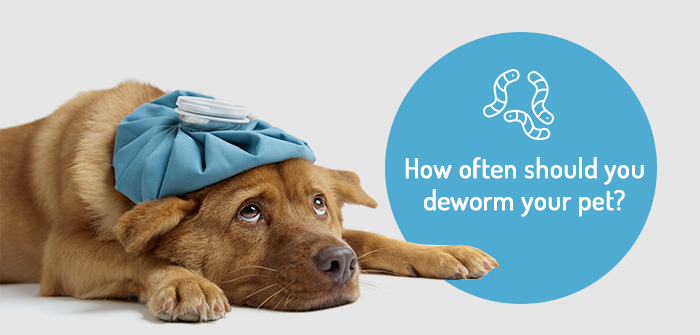How often should you deworm your pet?
Deworming has become a polarizing topic, particularly because many pet owners happen to disagree on how often they should deworm pets. Worms being the major culprits in our dogs’ lives, VetSupply has decided to clear the air on the deworming frequency of your pet to keep them free of these blood-sucking parasites.
But before we shed light on this debated topic, let’s walk through some of the basics of deworming pets.

Deworming Treatments for Cats and Dogs
If you have a pet, you may have heard about the threats of gastrointestinal worms from other pet owners or from your vet about the importance of deworming treatments. The common gastrointestinal worms that affect our pets include roundworms, hookworms, tapeworms, and whipworms. Anthelmintics (deworming treatments) are used to get rid of these worms. These deworming treatments come in the form of tablets, capsules, granules, chewables, topical and oral suspensions.
Now that you know about worms and dewormer treatments, let’s reveal the answers to this debated question without any further delays.
How often should you deworm your cat or dog?
The frequency at which you should deworm your pet depends on a lot of factors. In fact, different sizes, breeds, and ages of dogs will need different approaches, as discussed further below.
Depending on the size…
When it comes to deworming frequency, the size of the dog makes no big difference. The frequency of deworming is determined more by the environment, age of the dog, living conditions, and veterinarian recommendations, rather than the size of the individual dog.
However, the size of the pet is essential while choosing the size of the dewormer. You will find different packs with different compositions of a dewormer treatment varied by the weight or the size of your pet. It is essential to choose the right dosage for your pet, so if needed, do not hesitate to consult your vet regarding the same.
Deworming puppies and kittens…
You might be surprised to know that puppies and kittens are born with worms and, hence, they should be dewormed early. If failed to do so, they can spread worm eggs that will contaminate the soil and re-infect them.
Puppies & kittens should be dewormed every 2 weeks, starting from 2 weeks of age to 3 months of age, and then dewormed monthly until 6 weeks of age. On the other hand, adopted puppies and kittens should be dewormed immediately. If you adopt a pet from an animal shelter or adoption home, ask them if they have already dewormed the pet or not.
Deworming adult cats and dogs…

As discussed earlier, the frequency of deworming depends on a lot of factors. If you live in a low-risk area or your pet doesn’t get out of the house to interact with other pets very often, deworming may not be essential during winters when the ground freezes. It should be noted that dewormers should never be used unless necessary, so during winter, your vet will only recommend deworming if your pet shows symptoms of worms such as diarrhoea & vomiting.
On the other hand, if you live in a high-risk area where worms thrive, it becomes essential to deworm your adult dog or cat regularly every 3 months.
Deworming Pregnant Pets…
Now that you know that puppies and kittens are born with worms, you should also keep in mind that deworming pregnant pets can decrease the number of worms passed to the young. Admittedly, deworming medication does not kill hookworms and roundworms that have become encysted within the mother’s muscle tissues.
Does your pet need deworming throughout its life?
Your pet needs deworming for tapeworms throughout their life, whereas the same is not necessary in the case of roundworms and hookworms because tapeworms live only in the intestines of pets, and hence, the pet’s immune system doesn’t recognize them as foreign bodies and doesn’t make antibodies against it.
As a result, pets develop no immune response to repeated tapeworm infections. However, you can control tapeworms by preventing the fleas which transmit them.
Some of the best flea treatments are Nexgard Chewables, Revolution, Bravecto Chews, and Advantage.
The Final Word
Make sure to prevent the annoying worms from attacking your pet through effective deworming treatments like Drontal, Popantel, Milbemax, and many more available in the market. You can also get them at discounted rates with free shipping from an online pet store like VetSupply.





